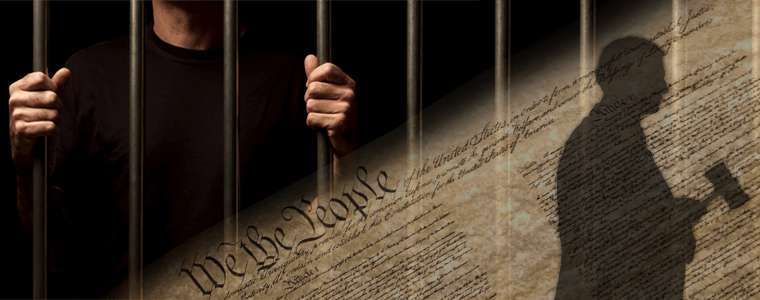Start a fire to burn brush on your own property and get charged as a Terrorist.
In the case Hammond v. United States of America, the defendant has appealed to the U.S. Supreme Court in hopes of having the Court answer two pressing questions. First, when can a federal district court hold that a minimum mandatory sentencing statute violates the Eight Amendment prohibition against excessive fines; and secondly, can the government appeal from a plea agreement when the defendant has waived his right to appeal?
The facts in Hammond are pretty much undisputed. Hammond and his son are cattle ranchers who worked about ten thousand private acres of land and had permission to use some federal land as well. They were model citizens with no prior criminal histories. Pursuant to their jobs as cattle ranchers they lit several fires, as is customary in that line of work, for the purpose of burning brush. They also lit a “backfire” to stop a wild fire that had been started by a lightning strike. Lighting fires to stop larger fires and to burn brush is a common practice that many cattle rancher engage in. Furthermore, the bureau of land management lights fires on federal land for the same purposes. On a couple of occasions while burning land, the fire spread to some federal land, burning approximately 139 acres. The jury found that there was less than $1,000.00 worth of damage done to the federal land and there was compelling evidence that suggested that the federal land was actually improved by the fires by making it suitable for grazing.
Mr. Hammond and his son were charged with nineteen counts, including charges from the Anti-Terrorism Act of 1996 which required the Judge to sentence the Hammonds to a minimum of 5 years. The Anti-Terrorism statute states in part, “Whoever maliciously damages or destroys . . . by means of fire. . .” shall be sentenced to not less than five years.
After a trial by jury that came back with a partial guilty verdict, basically finding them guilty of a couple of the 19 charges, the Hammonds wished to enter a plea so as to not prolong the case. The federal government accepted their plea and the Hammonds waived their right to appeal the district court’s decision. The district court found that applying the Anti-Terrorism statue in this case was a violation of the Eighth Amendment’s prohibition against cruel and unusual punishment in that it was unusually severe. The District court concluded that the Anti-Terrorism statute was never intended to be used against a cattle rancher burning brush. The district court sentenced them to three and twelve months respectively. The three and twelve month sentences were in line with the sentencing guidelines for defendants in their situation.
The government, who had previously accepted the plea, was displeased with the district court’s refusal to enforce the anti-terrorism statute and appealed the sentencing. The case has now been appealed to the US Supreme Court.
The 1996 Anti-Terrorism statute has been used in many prosecutions over the last several years, mainly against domestic terrorists. In each of these previous cases the defendants were using bombs, explosives or other devises of mass destruction to inflict massive economic and non-economic damages on groups of people or the government. The Anti-Terrorism statute had never been used against a law abiding, model citizen for minimal damages caused unintentionally, until now.
The main issue before the Supreme Court is when a court can refuse to impose a minimum sentencing statute because it violates the eighth amendment. The eighth amendment prohibits excessive bail or fines and cruel and unusual punishment. Congress has the authority to establish sentencing guidelines and require Judges to impose a minimum sentence for a certain crime. Congress cannot establish a minimum sentence that violates the eighth amendment’s prohibition against excessive fines. Courts have ruled that the eighth amendment can be applied on a case by case basis and it only prohibits “extreme sentences” that are “grossly disproportionate.”
In this case, the statute used was designed to apply to terrorists and (with one exception) had only been used against actual terrorists up to that point in time. It would seem to the casual observer that a law abiding rancher, burning land in the customary fashion, that, unintentionally, gets out of hand and burns a few acres of government land, doing less than $1,000.00 of damage should not be charged and sentenced as a terrorist. A reasonable person would conclude that a defendant that was responsible for starting a fire that accidentally did less than $1,000.00 of damage should not have to sit in a federal prison for a minimum of 5 years.
The other issue is the inherit unfairness of requiring a criminal defendant to waive his right to appeal the decision in a plea situation while the government retains their right to appeal from a plea. There is a slit of authority on this matter; the Fourth Circuit does not allow an appeal by the government from a plea deal while the Ninth circuit allows the government to appeal.
In my opinion, the Supreme Court should decide on these two important matters. Congress cannot envision every single defendant, and therefore minimum sentencing guidelines must, from time to time, place people in prison for unusually long periods of time. The Judge who is sitting in the court room hearing the evidence and looking into the eyes of the defendant should have the authority to lower the sentence in circumstances such as this. It is grossly unfair when the all-powerful government can railroad a defendant into a plea deal, require the defendant to waive his right to appeal, and then decide they don’t like the decision and appeal the plea deal. If the defendant is required to waive his right to appeal in order to make a deal, then the government should have to waive their right to appeal for the same deal.
This blog may be considered Advertising Material.


